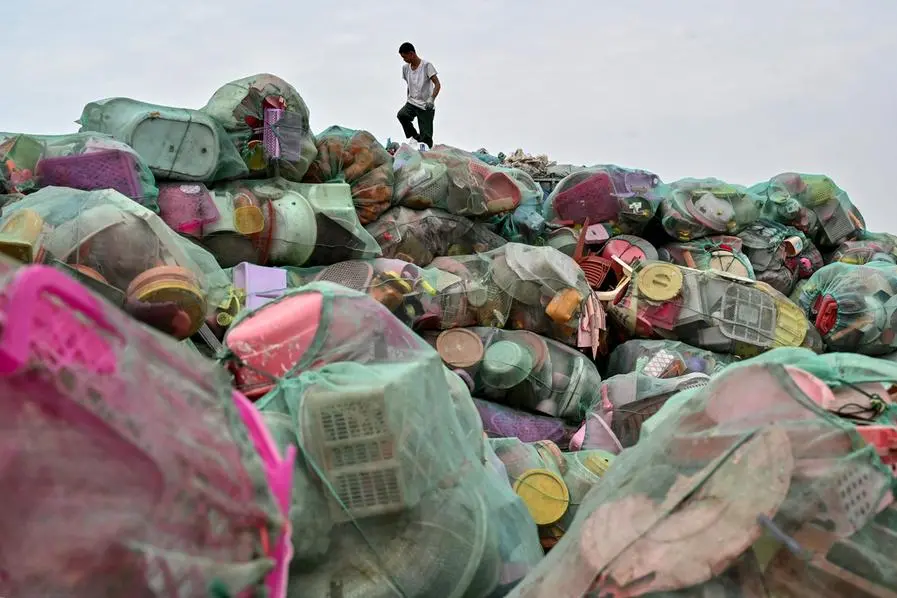PHOTO
Efforts to rid Nigerian cities and towns of waste are gaining more ground as the Sustainable Research and Action for Environmental Development (SRADev Nigeria), under the auspices of Global Alliance for Incinerator Alternatives (GAIA), is leading other stakeholders to advance advocacy for zero waste initiative in Nigerian cities.
Speaking to the stakeholders’ workshop organised in Lagos at the weekend, the Executive Director, STRAdeV Nigeria, Dr Leslie Adogame, said the essence of the forum is to propose a new strategy of zero waste initiative and advance its popularity across the states of the federation using Lagos as a pilot project.
The stakeholders comprised residents, students, waste pickers, waste managers, waste recyclers, experts and officials of the Lagos’ Ministries of Environment and Agriculture, Lagos State Waste Management Authority (LAWMA) and Lagos State Environmental Protection Agency (LASEPA), among others.
Reducing waste at source, Adogamme said, is objectively the goal of the project by strengthening capacity building to go into zero waste and getting the best approach.
He decried the way Nigerians have been managing waste, saying it is nott good, advising that the challenge of waste management should be a joint effort rather than leaving it for the government alone.
The workshop had the theme, ‘Advancing Capacity and Strengthening National Advocacy Towards Implementing A Zero Waste Initiative in Plastic Waste Management in Nigeria.’
Some of the experts and government officials who spoke at the workshop supported the new initiative, describing it as a sustainable and proactive way of managing waste.
They said if all stakeholders should get the new initiative right with Lagos, it would be easier to get it right with other cities in Nigeria.
Best waste management practices from other countries like Tanzania, Senegal and others were also showcased during the workshop.
Speaking further, the Executive Director of SRADeV said: “Environmentally speaking, waste is an inevitable outcome of human existence. Human beings will continue to produce waste until such a human being is in a state of being disposed as waste. And because of that, we just can’t but find a sustainable way of managing waste.”
“Waste management is a huge challenge. Waste is all centred, from solid, liquid and gaseous waste. If waste is not managed sustainably, the impacts are enormous, which is what we are already facing today. Either the impact on the physical ecosystem or the impact on public health, we have been so challenged.”
On the choice of Lagos for the workshop, Adogame said: “Lagos is the Centre for Excellence. We think that waste management in a mega city like this should be a priority. We know that the Lagos State government is confronting it to some levels of satisfaction, the challenge we have is that of the people, the followership of the process, the waste producers.
“The people who produce waste should take responsibility for their waste, as such, there is no way we can continue with this approach of just releasing waste into the environment and expect LAWMA to continue to manage the sustainability; it doesn’t happen anywhere.
“So, we are flagging this project for us to have a paradigm shift. We are talking with government; we want to collaborate with Lagos State government before we scale up to the federal level that every developed country has embraced zero waste management approach.”
He explained that zero waste management control or concept meant that from household, industry, individual production levels, people need embark on reduction of waste production, separation and sorting.
“What are the recycling products? What are not the recycling products? What are the organic products? Who needs my waste? Who doesn’t need my waste?
“Waste is a resource. In exchange of waste, we should know that reducing waste at source as it is done in other parts of the world is what Lagos State needs to embrace and until we entrench this, there no way, no equipment, no infrastructure Lagos State government can purchase or replace that can effectively manage waste in Lagos.
“We have estates. We want to do a pilot project on what zero waste actually mean. How Lagos State should reduce its waste at source, how estate and school children should begin to be taught zero waste so that what eventually should be getting to the dump sites that are already overblotted becomes minimal waste.
“What is a waste to me should be a resource to another. We want to organise Lagos in a way that we have waste exchange companies. What I don’t need is useful to another company and we can see it happening in the plastic sector already,” he added.
He said SRADeV Nigeria is committed to advocating sustainable waste management practices that prioritise public health and environmental safety.
Copyright © 2022 Nigerian Tribune Provided by SyndiGate Media Inc. (Syndigate.info).





















